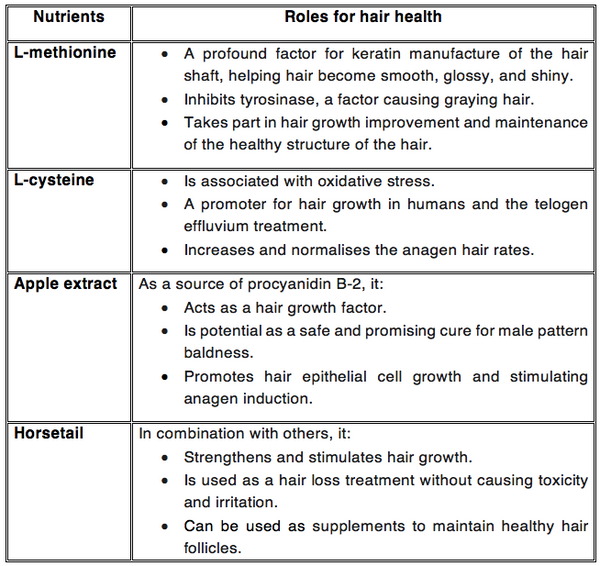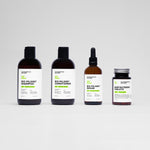Alongside vitamins, there are also abundant nutrients that carry the potential to help improve hair quality and reduce hair loss. Based on a review of diverse research on this topic, we would like to introduce you to four potent nutrients and food: L-Methionine, L-Cysteine, apple extract and horsetail.
As there has been an increase in communications regarding them, this blog will walk you through their specifications, characteristics, and promising effects on hair health in more detail.
[[textbox]]
Table of content
Summary
L-Methionine is an essential amino acid vital for protein synthesis and plays a key role in hair health by contributing to keratin production, preventing greying, and protecting hair from damage.
L-Cysteine, a non-essential amino acid, strengthens hair by forming disulfide bridges, helping retain moisture, and promoting hair growth. It's especially effective when combined with B-complex vitamins.
Apple extract contains procyanidin B2, which regulates hair growth and has shown promise in increasing the number of hairs and terminal hairs.
Horsetail, a medicinal plant, has been used for hair strengthening and growth stimulation. It can be effective in addressing hair thinning and hair loss, particularly when combined with other nutrients.
[[textbox]]
As your leading source for hair health information over the past 4 years, we never compromise on accuracy. When it comes to your health, you deserve information you can truly rely on - and earning your trust is our top priority.
Here's how Scandinavian Biolabs ensures every piece of content meets the highest standards of accuracy and integrity:
- Credentialed Experts: Our reviewers are actively practicing doctors and medical researchers
- Stringent Reviews: Content undergoes rigorous editing by subject specialists and review by a practicing doctor.
- Evidence-Based: We rely on well-established research from trusted scientific sources like peer-reviewed journals and health authorities.
- Full Transparency: Our editorial standards, writer credentials, reviewer credentials, correction process, and funding are all publicly documented.
- Independent Voice: While we do promote products, we operate in a vacuum to business operations. Our main goal is just an unwavering commitment to providing medically-sound guidance.
You can count on Scandinavian Biolabs to consistently deliver the trustworthy health information you deserve. Read our Editorial Standards.
L-Methionine
What is Methionine?
Methionine, an essential sulfur-containing amino acid, is a primary building block of protein synthesis and has a vital role in many functions within the body. However, it is not naturally created by the body and therefore must be consumed in the diet.
Methionine exists in two forms, D-Methionine and L-Methionine, which share the same chemical composition. It is the molecules’ configurations that set them apart from each other.
The benefits of L-Methionine
In particular, L-Methionine is irreplaceable because it actively contributes to the methylation cycle, the biochemical process that converts nutrients into energy for optimal function of almost every biological system of ours. It is also one of the precursors of choline, adrenaline, and other biologically active compounds.
Furthermore, L-Methionine is a sulfur source in the biosynthesis of cysteine. Additionally. a deficiency of L-Methionine may cause disorders in the biosynthesis of proteins, the deceleration of organisms’ growth and development, and functional disturbances.
The key element of L-Methionine is sulfur, a profound factor for keratin manufacture of the hair shaft. Thus, it is not surprising that L-Methionine could help your hair become smooth, glossy, and shiny.
Also, research has found that L-Methionine may effectively inhibit tyrosinase, a factor causing greying hair.
Besides its benefits for the presence of your hair, this amino acid contains properties that could protect your hair from free radicals, which helps to improve hair growth and efficiently maintains hair structure.
Due to its significant role, maintaining a sufficient level of L-Methionine through the daily intake is of great importance. This amino acid can be found abundantly in meat, fish, and dairy products.

L-Cysteine
L-Cysteine is a non-essential amino acid, one that the body can synthesise via the trans-sulphuration pathway from L-Methionine degradation and the breakdown of endogenous proteins. This amino acid is also one of the building blocks of the protein synthesis process.
Many studies and clinical trials have demonstrated the benefits of L-cysteine on human health.
It has an antioxidant role, encompasses mucolytic function, contributes to the regulation of the activity of the immune system, enhances the protection of the digestive system, reduces the risk of stroke, and helps strengthen the hair.
The influence of L-Cysteine on hair health
L-Cysteine forms disulfide bridges, which provides strength and rigidity to keratin. As keratin is one of the most abundant proteins in the skin and the hair, this amino acid via its role in keratin enhances the fibrous properties of hair, allowing hair to retain moisture.
Consequently, the use of blends fortified with L-Cysteine helps promote the repair of structural lesions and help slow down hair loss experienced by patients affected by certain disorders (e.g., diffuse alopecia.)
There is growing evidence showing that L-Cysteine, in combination with B-complex vitamins, could be a factor to help promote hair growth and an effective factor in the telogen effluvium stage.
Since the early 1990s, studies on the effect of dietary supplements containing L-Cysteine, medicinal yeast (a rich natural source of amino acids and B vitamins), thiamine (Vitamin B1), and pantothenic acid (Vitamin B5) have received significant attention.
Research findings showed an improvement in the Trichogramma, a semi‐invasive technique for the hair loss evaluation, in hair swelling and the tensile strength of the hair fibre.
Also, a major study has shown that the combination of L-Cysteine and those other factors can increase and normalise the anagen hair rates within six months.
Apple Extract
We all know that apples are an incredible fruit that offers multiple benefits, including help the immune system, help lowering diabetes risk and so forth.
But did you know that apples are also one potent source of procyanidin B2?
Procyanidin B2 is a polyphenol compound with a wide range of pharmacological effects. Besides contributing to cell proliferation, differentiation and regulation, it also regulates hair growth by inhibiting protein kinase C, a major signal transduction pathway in many tissues and cells.
Procyanidin B2 therapy shows potential as a safe and promising ingredient for male pattern baldness. Other studies have shown that this compound could assert an inhibitory effect on keratinocytes in both skin and hair. Thanks to that, it could help promote hair epithelial cell growth and stimulate anagen induction.
The research of Kamimura in 2000 showed that procyanidin B2 isolated from apple extract with a purity exceeding 94% acts as a hair growth factor in the murine model both in vitro and in vivo.
The research examined how 1% procyanidin B-2 tonic affected the hair growth of 29 participants divided into 2 groups. One group consisted of 19 participants treated with the procyanidin B2 and one placebo control group of 10 others. The examination reported an increase in the number of total hairs and terminal hairs in the designated scalp area of the prior compared with the latter.

Horsetail
Horsetail is a perennial fern from the Equisetaceae family. Its most widely known phytochemical compounds are flavonoids, phenolic acids, alkaloids, phytosterols, tannins, and triterpenoids.
Thanks to its diverse biological effects, such as antioxidant, antibacterial, antifungal, vasorelaxant, neuro, cardio protectors, and antiproliferative properties, horsetail is identified as a medicinal plant mentioned in European Pharmacopoeia.
Indeed, traditional medicines have used horsetail for hair strengthening, growth stimulation, and hair loss products without causing irritation or toxicity for the dermal papilla cells.
For instance, the mixture of its extract and mustard oil has been applied as a hair tonic. Additionally, there is a report regarding the superior reduction of telogen effluvium duration in patients treated with a herbal drug containing horsetail extract compared to minoxidil solution after seven weeks of treatment.
Last but not least, in the combination including vitamin C derived from acerola cherry, Procyanidin B-2 (apple extract powder), L-cystine, and L-methionine, horsetail can be beneficial for treatments of hair thinning and hair loss.
Conclusion
The four substances mentioned above can help with beneficial effects for your hair. Their roles are summarized in the following table:

While recent research has found these nutrients to be promising aids for hair growth and overall hair condition, they are still not as widespread in hair supplements as other nutrients like vitamin B or zinc. That’s why we combined them with well-known ingredients to create our unique Hair Nutrient Tablets.
Hair Nutrient Tablets are formulated with a blend of apple extract in combination with horsetail extract and amino acids. It is a concentrated source of B-vitamins and C-vitamins. The formulation includes zinc, which contributes to the maintenance of your normal hair, and riboflavin which contributes to the protection of cells from oxidative stress. They are formulated to supplement a varied diet. Try them today and see for yourself!
Disclaimer:
The information we provide is not intended to mitigate, prevent, treat, cure or diagnose any disease or condition. If you have any concerns about your health, please consult your doctor.
References:
- Ablon, G., & Dayan, S. (2015). A Randomized, Double-blind, Placebo-controlled, Multi-center, Extension Trial Evaluating the Efficacy of a New Oral Supplement in Women with Self-perceived Thinning Hair. The Journal of clinical and aesthetic dermatology, 8(12), 15–21.
- Borowczyk, Suliburska, J., & Jakubowski, H. (2018). Demethylation of methionine and keratin damage in human hair. Amino Acids, 50(5), 537–546. https://doi.org/10.1007/s00726-018-2545-3
- Chaiyana, Punyoyai, C., Somwongin, S., Leelapornpisid, P., Ingkaninan, K., Waranuch, N., Srivilai, J., Thitipramote, N., Wisuitiprot, W., Schuster, R., Viernstein, H., & Mueller, M. (2017). Inhibition of 5α-reductase, IL-6 secretion, and oxidation process of equisetum debile roxb. Ex voucher extract as a functional food and nutraceuticals ingredients. Nutrients, 9(10), 1105–. https://doi.org/10.3390/nu9101105
- Glynis Ablon, "A 3-Month, Randomized, Double-Blind, Placebo-Controlled Study Evaluating the Ability of an Extra-Strength Marine Protein Supplement to Promote Hair Growth and Decrease Shedding in Women with Self-Perceived Thinning Hair", Dermatology Research and Practice, vol. 2015, ArticleID 841570, 8 pages, 2015. https://doi.org/10.1155/2015/841570
- Kamimura, Takahashi, T., & Watanabe, Y. (2000). Investigation of topical application of procyanidin B-2 from apple to identify its potential use as a hair growing agent. Phytomedicine (Stuttgart), 7(6), 529–536. https://doi.org/10.1016/S0944-7113(00)80040-9
- Nutraceuticals and Natural Product Derivatives: Disease Prevention and Drug Discovery, edited by Mohammad Fahad Ullah, and Aamir Ahmad, John Wiley & Sons, Incorporated, 2019. ProQuest Ebook Central, http://ebookcentral.proquest.com/lib/tampere/detail.action?docID=5613477.
- Pallag, A., Filip, G. A., Olteanu, D., Clichici, S., Baldea, I., Jurca, T., Micle, O., Vicaş, L., Marian, E., Soriţău, O., Cenariu, M., & Mureşan, M. (2018). Equisetum arvense L. Extract Induces Antibacterial Activity and Modulates Oxidative Stress, Inflammation, and Apoptosis in Endothelial Vascular Cells Exposed to Hyperosmotic Stress. Oxidative medicine and cellular longevity, 2018, 3060525. https://doi.org/10.1155/2018/3060525
- Schallreuter, Salem, M. M. A. E. L., Hasse, S., & Rokos, H. (2011). The redox - biochemistry of human hair pigmentation. Pigment Cell and Melanoma Research, 24(1), 51–62. https://doi.org/10.1111/j.1755-148X.2010.00794.x
- Yin, Ren, W., Yang, G., Duan, J., Huang, X., Fang, R., Li, C., Li, T., Yin, Y., Hou, Y., Kim, S. W., & Wu, G. (2016). l-Cysteine metabolism and its nutritional implications. Molecular Nutrition & Food Research, 60(1), 134–146. https://doi.org/10.1002/mnfr.201500031
- Yokota, & Ikeda, M. (2017). Amino Acid Fermentation (1st ed. 2017.). Springer Japan. https://doi.org/10.1007/978-4-431-56520-8







